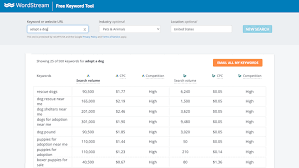
Unlocking the Potential: Mastering SEO Keywords for Digital Success
The Power of SEO Keywords
In the realm of digital marketing, Search Engine Optimization (SEO) keywords play a crucial role in determining the visibility and ranking of a website on search engine results pages. Understanding the significance of SEO keywords is essential for businesses looking to enhance their online presence and attract more organic traffic.
What Are SEO Keywords?
SEO keywords are specific words or phrases that users enter into search engines when looking for information, products, or services. By strategically incorporating relevant keywords into website content, meta tags, and other elements, businesses can improve their chances of appearing in search results for those terms.
The Importance of Choosing the Right Keywords
Effective keyword research is the foundation of a successful SEO strategy. By identifying and targeting the most relevant and high-traffic keywords in their industry, businesses can increase their visibility to potential customers actively searching for what they offer.
Optimising Content with Keywords
Integrating SEO keywords naturally into website content is key to improving search engine rankings. However, it’s crucial to strike a balance between optimising for search engines and providing valuable, engaging content for human readers. Overusing keywords (known as “keyword stuffing”) can harm a website’s credibility and ranking.
Monitoring Performance and Evolving Strategies
Regularly monitoring the performance of chosen keywords is essential for refining SEO strategies over time. By analysing data such as keyword ranking, organic traffic volume, and user engagement metrics, businesses can adapt their approach to stay ahead in an ever-changing digital landscape.
Conclusion
SEO keywords are powerful tools that can significantly impact a website’s visibility and success online. By conducting thorough keyword research, optimising content effectively, and continually refining strategies based on performance data, businesses can harness the full potential of SEO keywords to drive organic traffic and achieve their digital marketing goals.
Essential Guide to SEO Keywords: Understanding, Selecting, and Tracking for Optimal Performance
- What are SEO keywords and why are they important?
- How do I choose the right SEO keywords for my website?
- What is keyword research and how does it impact SEO?
- What is the difference between short-tail and long-tail keywords?
- How can I track the performance of my chosen SEO keywords?
What are SEO keywords and why are they important?
SEO keywords are specific words or phrases that users input into search engines to find relevant information, products, or services. They are crucial for enhancing a website’s visibility and ranking on search engine results pages. By strategically incorporating relevant SEO keywords into website content and meta tags, businesses can attract organic traffic from users actively searching for what they offer. Choosing the right keywords through effective research is essential for improving a website’s chances of appearing in search results and reaching its target audience effectively. In essence, SEO keywords serve as the bridge between what users are searching for and the content that websites provide, making them a fundamental aspect of any successful digital marketing strategy.
How do I choose the right SEO keywords for my website?
When it comes to selecting the most effective SEO keywords for your website, thorough research and strategic planning are key. Start by understanding your target audience and their search behaviour. Identify relevant topics and terms that align with your business offerings. Utilise keyword research tools to discover high-volume keywords with moderate competition. Consider long-tail keywords for more specific targeting. Analyse competitor strategies to gain insights into successful keyword choices. Continuously monitor and adjust your keyword selection based on performance metrics to ensure optimal visibility and engagement on search engine results pages. By following a systematic approach to choosing the right SEO keywords, you can enhance your website’s search engine rankings and attract valuable organic traffic.
What is keyword research and how does it impact SEO?
Keyword research is a fundamental aspect of Search Engine Optimization (SEO) that involves identifying and analysing the specific words and phrases users enter into search engines. By understanding the search terms most relevant to their target audience, businesses can strategically incorporate these keywords into their website content and meta tags to improve their visibility in search engine results. Effective keyword research not only helps businesses attract organic traffic but also enhances their chances of ranking higher for relevant searches, ultimately increasing their online presence and driving valuable traffic to their website.
What is the difference between short-tail and long-tail keywords?
Short-tail and long-tail keywords are two distinct types of search terms used in SEO strategies. Short-tail keywords are typically brief and generic phrases with high search volumes, such as “digital marketing.” In contrast, long-tail keywords are longer, more specific phrases that target niche audiences, like “best digital marketing strategies for small businesses.” While short-tail keywords generate more traffic, long-tail keywords often have higher conversion rates due to their specificity. Understanding the difference between these two types of keywords is essential for crafting a well-rounded SEO strategy that effectively targets both broad and niche audiences.
How can I track the performance of my chosen SEO keywords?
Tracking the performance of chosen SEO keywords is essential for evaluating the effectiveness of an SEO strategy. One common method is to use online tools such as Google Analytics or SEMrush to monitor keyword rankings, organic traffic volume, and user engagement metrics. By regularly analysing this data, businesses can gain insights into which keywords are driving the most traffic and conversions, allowing them to make informed decisions about adjusting their keyword targeting and content strategies to maximise their online visibility and reach their digital marketing objectives.

